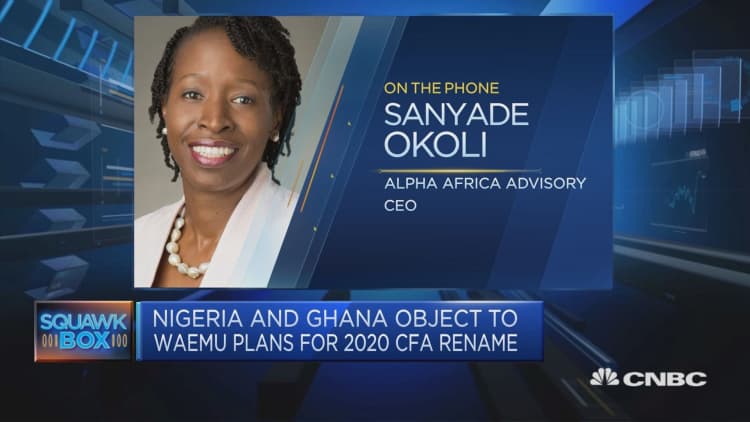With a host of international investment conferences lined up for African nations in 2020, leaders across the continent are optimistic about the continent's fertility for international investors.
However, significant barriers to entry and political risks remain, including sluggish economic growth in major economies and stiff competition among overseas investors seeking to capitalize on the privatization of state-owned enterprises and infrastructure deals.
Annual research from business risk consultancy EXX Africa has identified key risks facing the continent in 2020, and the countries which are best and worst positioned to mitigate them.
Winners
Having once been Africa's "poster child for debt distress, currency collapse and weak governance," the EXX Africa report said, Mozambique will leverage massive foreign investment flows in natural gas and associated industries to turn things around in 2020.
"Potential IMF support, improved banking sector performance, and the outcome of international legal processes into the hidden debts scandal will be key indicators for our optimistic projection," the report added.
With South African President Cyril Ramaphosa facing public backlash and a slowing economy amid the sluggish pace of his ambitious reform agenda, EXX Africa analysts anticipate that the administration will ramp up efforts to overhaul the power sector and restore economic stability in 2020.
Africa's most industrialized economy has faced weak economic indicators, soaring debt and potential credit rating downgrades, but Ramaphosa's allies within the ruling ANC are pushing for reforms which EXX Africa suggested would see South Africa record a notable improvement in its risk profile for investors.
Egypt has enjoyed three years of economic stabilization, which the report anticipated will begin to pay off in 2020 through improved living standards and greater foreign investment in sectors beyond natural gas, such as the nascent mining sector and infrastructure, offering a more diversified economic base.
Other potential "winners" are Tunisia, depending on whether the new government can hold together and positive economic indicators are realized, along with Ethiopia, providing the government's reformist privatization plans begin to bear fruit and upcoming elections unfold peacefully.
Losers
Battling an "alarming increase" in the spread of Islamist insurgency and terrorism, along socio-economic grievances, Burkina Faso topped the charts for risk, with EXX Africa analysts deeming the local security apparatus "ill-equipped to counter the threat" of rampant militancy.
Guinea's remarkable mining boom is threatened by President Alpha Condé's efforts to run for an unconstitutional third term against widespread resistance. The possibility of civilian and military unrest and ensuing foreign sanctions in the event of an escalation may prevent the government pushing through a constitutional amendment referendum and engender uncertainty for investors.
The third West African nation in the top five, Liberia, faces an economic crisis amid falling productivity, rampant inflation, and a massive current account deficit, according to the report.
"President George Weah is facing a backlash against his government over a failing economy and spiraling inflation, while mounting perceptions of graft and mismanagement are undermining his administration's credibility. The political opposition is galvanizing around a protest movement that will drive unrest risks in 2020," EXX Africa analysts said.
In Southern Africa, Zimbabwe is in the midst of its worst economic crisis in a decade, with food, medicine, fuel and power shortages accompanied by soaring inflation. The economy is expected to shrink by 13% in 2020. The country sits joint top with Burkina Faso as the most risky nation in Africa for investors.
Meanwhile Zambia faces the looming threat of a complete breakdown of its power supply, with exceptionally high debt levels meaning it may be unable to pay for electricity imports, providing a final push towards debt distress.
Five risk trends
Six national elections are to take place in West Africa and the turbulent Sahel region, with voters heading to the ballot box in Burkina Faso, the Central African Republic, Côte d'Ivoire, Ghana, Guinea and Togo. Elections will also be held in Ethiopia, Seychelles and Tanzania.
"In most of these votes, incumbents and entrenched ruling parties will face opposition forces revitalized by frustrated and economically marginalized urban youths, driving further risk of unrest and instability," the EXX Africa report said.
Political risk could manifest itself in the form of street revolutions, the report projected, pointing to recent demonstrations hijacked by powerful militaries in Algeria and Sudan within the past year. Political temperatures have also been on the rise in Tunisia, Burkina Faso, Zimbabwe and South Africa, and could offer investors further pause for concern.
A third trend to watch will be trade, with the planned African Continental Free Trade Agreement (AfCFTA) facing the daunting task of uniting and consolidating 54 countries into a single market amid global trends of nationalism and protectionism.
The difficulty of uniting behind common economic policy became evident last week in the dispute over the transition of eight francophone West African countries from the colonial CFA franc currency to the new 'eco', a move which polarized the 15-member Economic Community of West African States (ECOWAS). The risk that a chaotic currency transition triggers investor flight was also among the top five identified by EXX Africa.
Last but not least, Southern and East Africa face heightened risk from food insecurity, bilateral disputes, domestic unrest and uncontrolled migration as a result of power outages and water shortages. In countries like Zambia and Zimbabwe, this will further hit state-owned utilities and likely exacerbate already severe sovereign debt non-payment risks, the report suggested.


